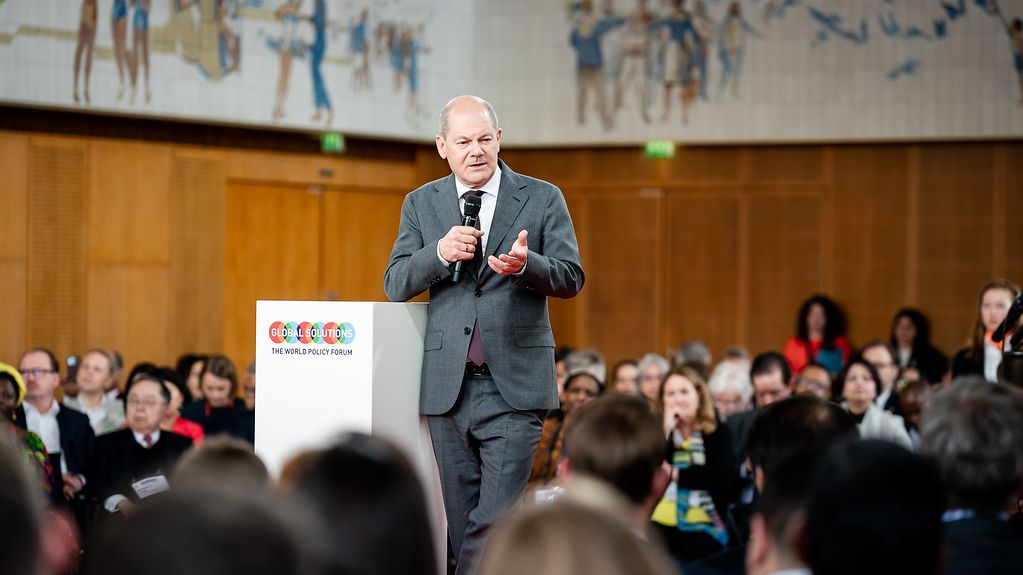Federal Chancellor Scholz at the Global Solutions Summit 2023
The international order is facing some enormous challenges in the areas of climate protection, migration, and the fight against poverty. At the same time, as Federal Chancellor Scholz emphasised at the Global Solutions Summit, the potential for global cooperation on an equal footing "has never been greater", whereby he focused particularly on cooperation with countries of the Global South.
3 min reading time

The world, said Federal Chancellor Scholz at the Global Solutions Summit in the run-up to the G7 Summit, was multi-polar, which meant that we now had to act accordingly.
Photo: Federal Government/Denzel
Participants at the Global Solutions Summit in Berlin representing politics, academia, and business, as well as think tanks, met to discuss global challenges such as climate protection, international regulatory policy, migration, combating poverty, and promoting human rights. They will then address their recommendations to the G20 and G7 states.
A more inclusive and balanced international order
"How can we maintain an international order based on the United Nations Charter and international law in the 21st century?" This, as Federal Chancellor Scholz emphasised in his speech, is one of the central questions of our time. Part of the solution, Scholz suggested, would be a more inclusive and balanced international order than has hitherto been the case.
To encourage the countries of the Global South to work with Europe and the rest of the world to build and defend a peaceful and stable international order, Scholz continued, they would need to be more involved than they had been in the past. The Federal Chancellor said he would personally advocate for this at the upcoming G7 summit and at the G20 summit in September.
The term Global South includes those countries previously referred to as developing or emerging economies, the majority of which are in Africa, Latin and South America, and Asia.
Engaging with countries of the Global South on an equal footing
The countries of Asia, Africa, and the Americas should not get the impression, said Federal Chancellor Scholz, "that we are only approaching them because we are interested in their raw materials or want their support for a UN resolution". The growing populations and economies in the Global South "expect representation on an equal footing".
Among other things, he said, this must be reflected in the distribution of seats in international organisations as well as in the European Union's trade policy. Rather than simply being extracted by a handful of countries, raw materials should increasingly be processed in their countries of origin. Germany had consciously included the heads of state and government of the Global South during its G7 presidency last year. Some of the tangible outcomes from these meetings include the Partnership for Global Infrastructure, the Alliance for Global Food Security, and the Global Climate Risk Shield for severely affected regions.
Mutually beneficial equitable partnerships
It is also in the interest of Germany and the rest of the European Union to have equitable partnerships with many different countries. Diversification could prevent dependencies on single suppliers and supply chain disruptions. According to the Federal Chancellor, the potential for global cooperation on an equal footing has never been greater.
These new forms of cooperation could also contribute to climate protection, "because", as Scholz said, "many African countries see the energy transition as an opportunity," a fact that he was able to verify for himself during a recent visit to East Africa. Kenya, for example, will soon be joining the International Climate Club, an ambitious German G7 initiative that advocates for the rapid implementation of the Paris Climate Agreement.
On 20 November, Federal Chancellor Scholz will be welcoming representatives of African countries to Berlin to promote the G20's Compact with Africa initiative. The initiative's goal is to stimulate economic growth in Africa and create incentives for private-sector investment.